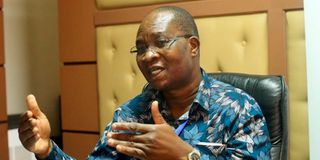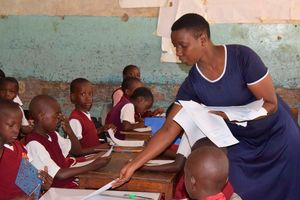
Prof Charles Ochieng’ Ong’ondo, the director and chief executive of the Kenya Institute of Curriculum Development.
The Kenya Institute of Curriculum Development (KICD) has been forced to go back to the drawing board and develop mathematics textbooks for learners not pursuing science, technology, engineering and mathematics (Stem) in senior school.
The new version of the subject will be referred to as ‘Essential Mathematics’ and will be offered to learners pursuing the Social Sciences and Arts and Sports pathways. The decision was made recently after the public uproar that greeted an announcement that mathematics would be optional in senior school.
“The idea at that point was that all learners need some form of mathematics at senior school. When that announcement was being made, we had already developed a curriculum for the particular subject that we thought was suitable for students opting for that option [Stem], so that is already gone and it will be offered as it was developed,” said KICD boss Prof Charles Ong’ondo.
The KICD has already released the results of the curriculum support materials, including the mathematics (the Stem option).
“That which is essential to other learners who are not doing Stem. So the mathematics which was already developed will be pursued by Stem students in senior school, essential mathematics by non-STEM students,” he says.
In an interview with the Nation, Prof Ong’ondo said that KICD will go through the relevant processes to incorporate the Essential Mathematics in senior school by the time the learners transition in 2026.
The curriculum designs for essential mathematics have already been drafted and will be edited next week. Thereafter, they will undergo other processes, including presentation to stakeholders known as the cross panel. The academic committee at KICD will then go through it for approval before it is taken to the council.
“All those processes are intended to end by June 2025. Thereafter, we will invite publishers to give us books for Essential Mathematics which will be evaluated in August 2025 so that we are ready to distribute the books alongside the other subjects for use by learners at Grade 10,” said Prof Ong’ondo.
He assured Kenyans that the institute has drafted the designs and will ensure there are books for non-Stem students.
“However, it must be understood that even students in these pathways who decide that they will do mathematics that will be undertaken by Stem students have the freedom to do so,” said Prof Ong’ondo.
Curriculum
In the 8-4-4 system, which is phased out, mathematics is a compulsory subject from primary up to secondary school level of education.

A schoolgirl solves a maths problem.
Following a major uproar from parents and other stakeholders, including teachers, the Ministry of Education announced that the subject would remain compulsory even in the competency-based education.
Prof Ong’ondo said the essence of core curriculum subjects in a country is to expose learners to certain skills and competencies.
“There are skills or competencies that are considered generic that every learner, regardless of the pathway they will have preferred, should be exposed to. The earlier conceptualisation of the curriculum subjects considered English Language, Kiswahili and Community Service Learning,” said Prof Ong’ondo.
Two weeks ago during the National Conversation on Competency-Based Education in Nairobi, Prof Ong’ondo explained that the English language was considered because it is widely used globally and also as a medium of instruction while Kiswahili was selected because it was adopted by the United Nations as the African, Kenyan and East African Community language of communication.
The curriculum expert further added that community service Learning is a powerful subject with utility values.
“The country has spoken; mathematics shall now be one of the core learning areas. Our duty shall be to take it through the relevant processes and I want to assure Kenyans that by the time we get to 2026, we shall have mathematics suitable in STEM and other pathways, complete with curriculum support materials,” said the KICD boss.
In senior school, learners will undertake seven subjects, four of which will be compulsory, including mathematics. The core subjects include English, Kiswahili, and Community Service Learning, which align with the 21st Century skills, and national, regional and global requirements.
The CBE cohort who are currently in Grade 9 in junior school will transition to senior schools next year, based on the career pathways of their choice, abilities and interests.
All national senior schools will offer mathematics and science subjects. Education Cabinet Secretary Mr Julius Ogamba is set to announce all the optional and compulsory subjects that will be offered in senior school before the transition in 2026.








